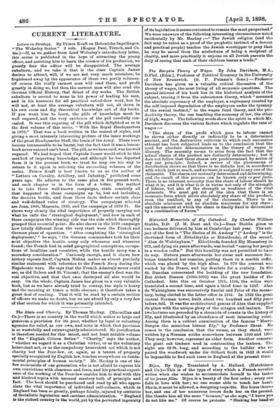The State and Charity. By Thomas Mackay. (Macmillan and Co.)—There
is no country in the world which makes so large and generous a provision for its poor, whether by legal or voluntary agencies for relief, as our own, and none in which that provision is so wastefully and extravagantly administered. No justification is therefore needed for this latest, and not least notable volume of the "English Citizen Series." "Charity," says the author, " whether we regard it as a Christian virtue, or as the voluntary benevolent act, or as the compulsory benevolent act which is not charity but the Poor-law, or, again, as a tenure of property specially recognised by English law, touches everywhare on funda- mental principles of human society." Mr. Mackay is one of the few economists of our generation who is not afraid to express his own convictions with clearness and force, and his practical experi- ence of the working of the Poor-law enables him to deal with this and kindred topics with unusual mastery both of principle and fact. The book should be purchased and read by all who appre- ciate the vital importance of individual self-reliance, which in England has been so greatly, perhaps fatally, injured by centuries of Socialistic legislation and careless administration. "England is the richest country in the world, yet by the perverted ingenuity of its legislation it seems contented to remain the most pauperised.° We were unaware of the following interesting circumstance noted incidentally by Mr. Mackay The Jewish religion (and the fact may be taken as a proof of the prophetic instinct of a devout and practical people) teaches the Jewish worshipper to pray that he may be saved from the misfortune of being a recipient of charity, and more practically it enjoins on all Jewish parents the duty of seeing that each of their children learns a trade."


































 Previous page
Previous page